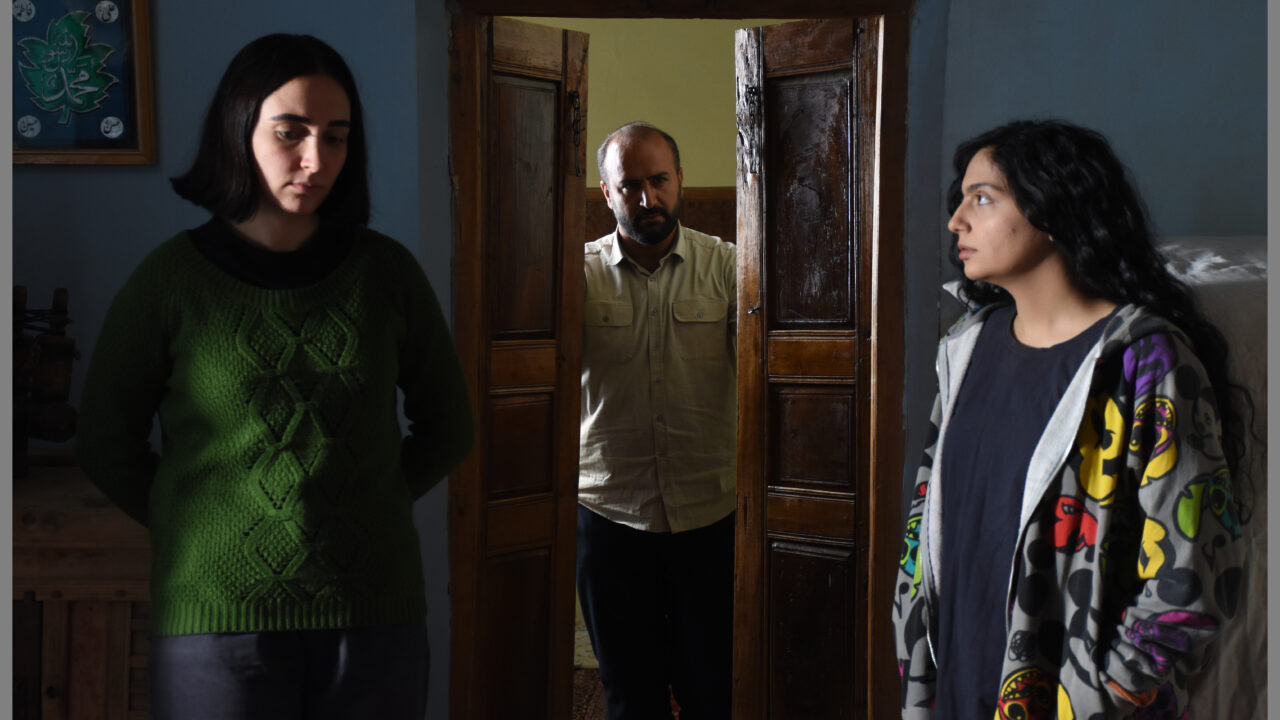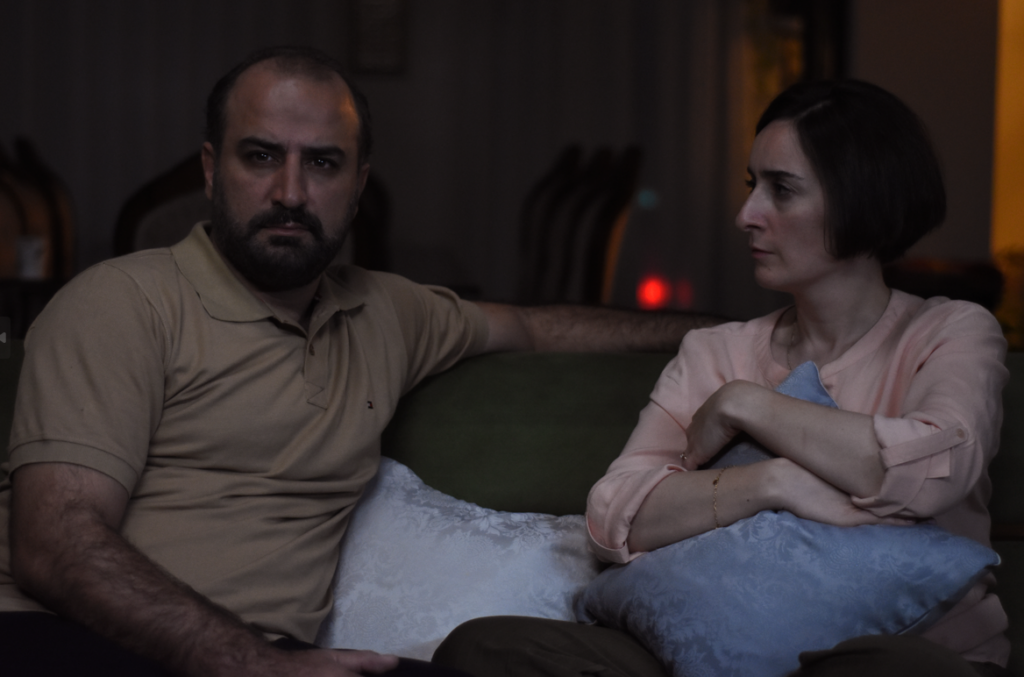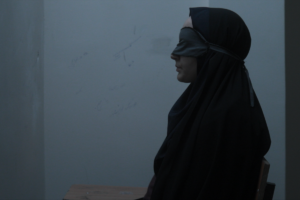The Center Cannot Hold
The personal is political in the Iranian drama “The Seed of the Sacred Fig.” (Image courtesy of Neon)
(Image courtesy of Neon)
When director Mohammad Rasoulof walked the Cannes carpet to unveil “The Seed of the Sacred Fig,” he held up photographs of two its leads — Soheila Golestani and Misagh Zare — who had been barred from leaving Iran. For Rasoulof to attend the French premiere, he had to first flee his home country via an undisclosed international route and take refuge in Germany, having been sentenced to eight years in prison, a fine and flogging because of his previous films that critiqued the Iranian regime. In a cinematic act of defiance, “Sacred Fig” is perhaps Rasoulof’s most challenging work, speaking truth to power in the form of a family saga whose intimate fault lines map perfectly onto Iran’s fragile political zeitgeist during the Woman, Life, Freedom movement in 2022.
In Tehran, the halls of power — or in this case, the halls of one judicial building, inside which the movie opens — are littered with cardboard cutouts of various clerical and governmental leaders. These life-size standees feature silver-haired men with stern expressions and their hands placed over their hearts, a gesture expressing sincerity and commitment. Upon closer inspection, a more sinister picture emerges. As the hallway re-appears throughout the movie (usually during plot centric walk-and-talks) one might catch a glimpse of blindfolded women made to stand up against the walls in between these effigies, as a form of punishment, as they await interrogation. This blindfolding has a basis in reality, but in “Sacred Fig” Rasoulof treats his images as literal and symbolic; it is only by pulling the wool over people’s eyes, after all, that power and corruption are allowed to thrive.

The turns on information — who has it and who controls it. Middle-aged government prosecutor Iman (Zare) is promoted to investigator, a position in the Revolutionary Court that requires secrecy, given the controversial sentences they are often forced to hand down. Iman’s wife Najmeh (Golestani) is his confidant, and together they decide to let their daughters in on his promotion for their safety: the young adult Rezvan and teenager Sana (played by actresses Mahsa Rostami and Setareh Maleki, who have both since fled the country, too.) But the two girls exist on the opposing side of a strict ideological divide from their more conservative, god-fearing parents. Each time television news station blare propaganda meant to smear young demonstrators, Iman and Najmeh place their implicit trust in the government’s words, while Rezvan and Sana, having seen images of police brutality on social media, try to convince them otherwise, in scenes rife with silences and whispers. Their attempts at reasoning only go so far.
Rasoulof finds cathartic ways to sublimate his and the viewer’s anger into something politically poignant.
Rasoulof’s screenplay frames the family unit as a site of power, with each instance of interpersonal tension a reflection of the larger goings-on just beyond the family’s home. A mother is torn between protecting her daughters and upholding patriarchal tradition; a father’s dedication to his loved ones is strained by his fealty to the regime. While much of the movie is contained to their apartment and other cramped interior spaces — Rasoulof, who had been barred from filmmaking, directed much of it remotely — the characters are constantly seen glancing out of windows at student protests, or returning from having been engulfed by these brewing demonstrations.
As the story develops, domestic bliss becomes illusory and the outside world takes hold inside the family’s four walls. In an early scene, the daughters’ friend Sadaf (Niousha Akhshi) comes for a casual visit and Najmeh carefully plucks Rezvan’s eyebrows, mirroring a later instance in which Sadaf is badly injured in a protest and Najmeh is forced to tweeze bits of debris from the young girl’s face in secret, lest her husband see. As the Woman, Life, Freedom movement grows, and Iman finds himself under increasing pressure and scrutiny, his disagreements with his daughters grow more intense until his suspicions break into absurdity and, finally, give way to literal ruins.
“The Seed of the Sacred Fig” may be dramatic fiction, but it’s separated from reality only by a razor-thin layer. Its use of real protest videos, in which women are beaten or arrested for burning their hijabs, are vital not only to the plot — they keep the audience abreast of the political backdrop through what Rezvan and Sana see — but to the film’s propulsive nature. In the process of inserting them at key moments — as the movie’s various subplots align, forming a causal locomotive — Rasoulof finds cathartic ways to sublimate his and the viewer’s anger into something politically poignant: a bone-deep understanding of the way power, and the struggles against it, trickle down through every fabric of society, and travel from capitol buildings out into streets, and eventually, into the home.
Your support is crucial...As we navigate an uncertain 2025, with a new administration questioning press freedoms, the risks are clear: our ability to report freely is under threat.
Your tax-deductible donation enables us to dig deeper, delivering fearless investigative reporting and analysis that exposes the reality beneath the headlines — without compromise.
Now is the time to take action. Stand with our courageous journalists. Donate today to protect a free press, uphold democracy and uncover the stories that need to be told.







You need to be a supporter to comment.
There are currently no responses to this article.
Be the first to respond.